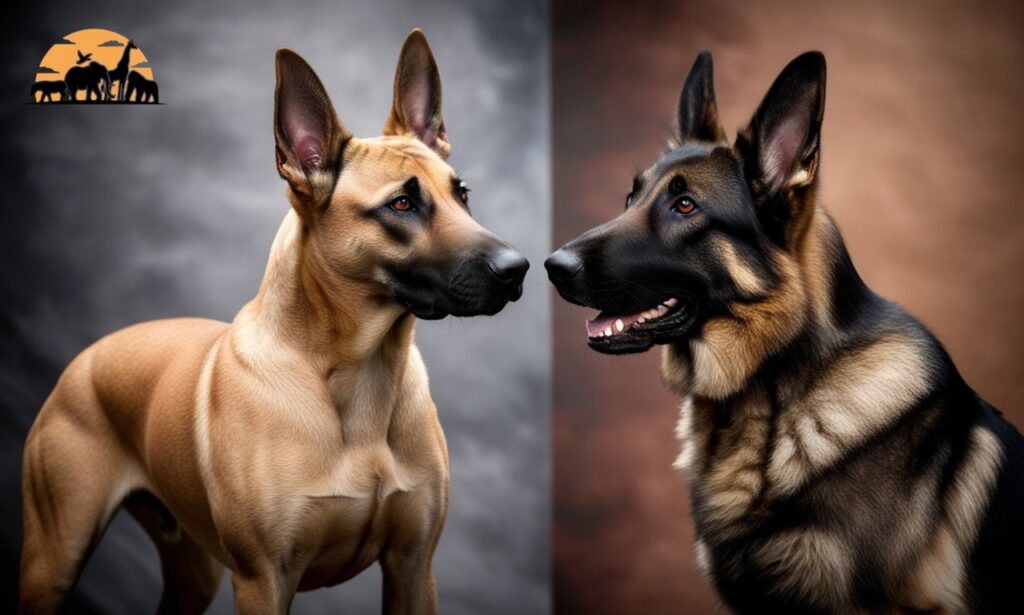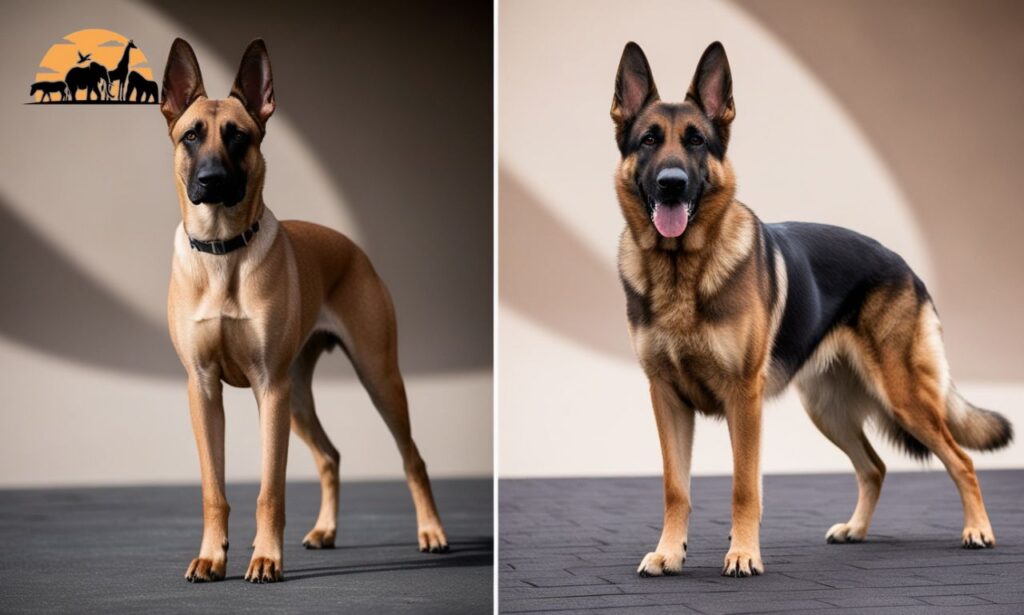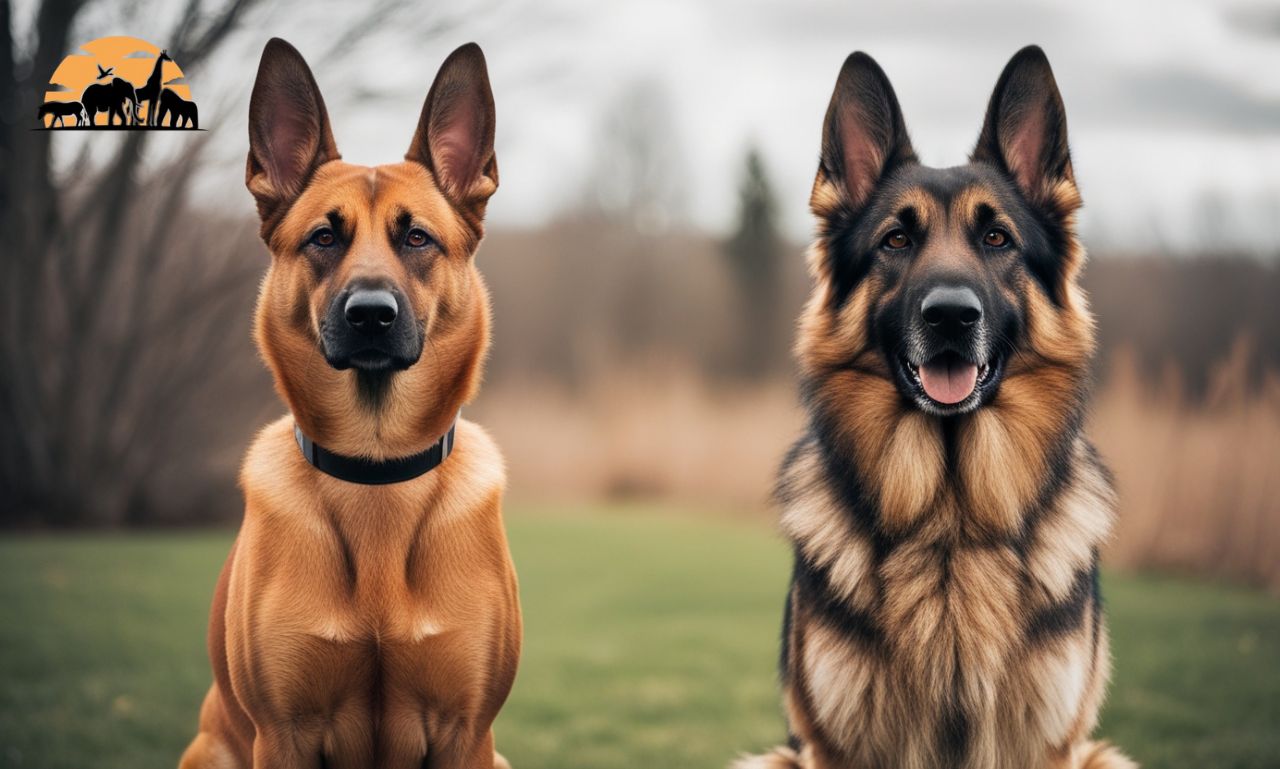Belgian Malinois vs German Shepherd
The Belgian Malinois and the German Shepherd are two remarkable breeds known for their intelligence, loyalty, and versatility. Although they share many traits, they differ in several important ways. Whether you’re considering adopting one of these breeds or simply interested in learning about their similarities and differences, this guide provides a detailed look at each dog’s characteristics, history, training needs, and suitability as a pet.
Breed Origins
Belgian Malinois: The Belgian Malinois originated in Belgium and is one of the four Belgian Shepherd breeds. Known for its agility and high-energy drive, it was bred primarily as a herding dog. Today, the Belgian Malinois is favored by military and police forces worldwide due to its speed, intelligence, and intense focus.
German Shepherd: The German Shepherd originated in Germany in the late 19th century. Developed as a working dog to help shepherds herd and guard flocks, this breed is highly valued for its versatility and loyalty. The German Shepherd has been employed in various roles, including police, military, and search-and-rescue, and it’s also a popular choice as a family companion.

Physical Appearance
Belgian Malinois:
- Size: Medium to large-sized dog, weighing 60-80 pounds on average.
- Height: Around 22-26 inches tall at the shoulder.
- Coat: Short, fawn-colored coat with a black mask and ears, giving it a sleek and streamlined look.
- Build: Athletic, lean, and muscular; known for its agility and speed.
German Shepherd:
- Size: Larger than the Malinois, usually weighing between 65-90 pounds.
- Height: 22-26 inches tall at the shoulder, similar to the Malinois.
- Coat: Dense double coat, often medium-length, that can come in various colors like black and tan, sable, and all-black.
- Build: Stockier and more solidly built than the Malinois, giving it a strong and commanding presence.
Temperament and Personality
Belgian Malinois:
- Temperament: Highly intelligent, driven, and energetic. Malinois dogs are known for their intense work ethic and focus, making them perfect for high-demand tasks.
- Energy Level: Extremely high-energy, needs consistent physical and mental stimulation.
- Social Behavior: While loyal to their families, they may be wary of strangers. They require early socialization to adapt well to family life.
- Protective Instincts: Highly protective, but their guarding behavior can be controlled with proper training.
Alaskan Husky vs Siberian Husky
German Shepherd:
- Temperament: Calm, confident, and loyal. German Shepherds are known for their balanced and stable nature, making them ideal for family life.
- Energy Level: High-energy, but generally calmer than Malinois, especially as they mature.
- Social Behavior: Friendly with family members and typically good with children. They may be reserved with strangers but not aggressive if properly socialized.
- Protective Instincts: Natural protectors, with a balanced approach to guarding and loyalty to their family.
Training and Intelligence
Both breeds are highly trainable and are considered among the most intelligent dogs.
Belgian Malinois:
- Training Needs: High. They thrive on advanced training and excel in agility, obedience, and protection work.
- Learning Speed: Quick learners with a strong drive, but their high energy requires consistent training.
- Best Training Approach: Positive reinforcement, combined with variety and mental challenges, keeps them engaged.
- Suitability: Ideal for experienced owners who can commit to daily training sessions and activities.
German Shepherd:
- Training Needs: High but easier to manage than the Malinois for beginners.
- Learning Speed: Intelligent and quick learners, adaptable to various training tasks.
- Best Training Approach: Positive reinforcement works well, along with patience and consistency.
- Suitability: More adaptable to novice owners than the Malinois but still requires regular training and exercise.
Exercise and Mental Stimulation Needs
Belgian Malinois:
- Exercise Requirements: Extremely high. Malinois need multiple daily sessions of vigorous activity, including running, agility, or advanced training.
- Mental Stimulation: These dogs thrive on mentally challenging activities and tasks, making puzzle toys, obedience training, and scent work ideal.
- Suitability for Apartment Living: Not ideal. They need space to run and play and can become restless in confined spaces.
German Shepherd:
- Exercise Requirements: High. They need at least one to two hours of exercise daily, but they can be more adaptable to indoor rest periods than the Malinois.
- Mental Stimulation: Like the Malinois, they need mental challenges but are generally less intense in their need for constant stimulation.
- Suitability for Apartment Living: Can adapt better than the Malinois if given ample exercise but still prefer open spaces.

Health and Lifespan
Belgian Malinois:
- Lifespan: Generally lives between 12-14 years.
- Health Concerns: Prone to hip dysplasia and progressive retinal atrophy but generally considered a healthy breed.
- Grooming Needs: Low maintenance; regular brushing is enough.
German Shepherd:
- Lifespan: Typically lives 9-13 years.
- Health Concerns: Prone to hip and elbow dysplasia, as well as degenerative myelopathy. They may also experience issues like bloat.
- Grooming Needs: Moderate; they shed seasonally and benefit from regular brushing to control shedding.
Suitability as Family Pets
Belgian Malinois: The Malinois is best suited for active families or individuals who are experienced dog handlers. While loyal and affectionate, they need an environment where they can be active and mentally stimulated daily. They’re often better suited for working environments or active, outdoor lifestyles than for households with small children or less experienced owners.
German Shepherd: German Shepherds tend to be more adaptable to family life and are good with children when properly socialized. They can serve as family protectors and are generally more relaxed in home environments than the Malinois. For families with time for training and exercise, German Shepherds can make fantastic, loyal pets.
Belgian Malinois vs. German Shepherd: Which is Right for You?
- Choose the Belgian Malinois if: You’re experienced with dogs, lead an active lifestyle, and can provide them with a highly structured environment with plenty of daily exercise and mental challenges.
- Choose the German Shepherd if: You’re looking for a loyal, intelligent family dog who can be protective yet gentle with children and is adaptable to a calmer home environment.
Watch
Conclusion
Both the Belgian Malinois and German Shepherd are exceptional breeds, each with unique traits that make them outstanding working dogs and companions. While the Malinois requires a bit more experience and activity, the German Shepherd offers versatility for a wider range of families. Whichever breed you choose, remember that these dogs thrive best in environments where they are challenged mentally and physically, and where they can develop a strong bond with their families.
Read About German Shepherd Puppies
FAQs
1. Which breed is easier to train?
Both breeds are highly intelligent and trainable, but the German Shepherd is generally more adaptable and easier for novice owners. The Belgian Malinois requires a more experienced handler due to its high energy and intense focus.
2. Are Belgian Malinois or German Shepherds better with kids?
German Shepherds are generally known to be more family-friendly and good with children, especially if raised with them. Belgian Malinois can be good with kids but may be a bit too energetic for young children.
3. Which dog has higher exercise needs?
The Belgian Malinois has extremely high exercise requirements and thrives on intense physical and mental activities. The German Shepherd also needs a lot of exercise but is more adaptable to moderate levels than the Malinois.
4. Do both breeds make good guard dogs?
Yes, both the Belgian Malinois and German Shepherd are natural protectors and make excellent guard dogs. They are loyal and protective of their families.
5. Are Belgian Malinois or German Shepherds healthier?
Both breeds have health risks, though the Belgian Malinois tends to have fewer genetic health issues than the German Shepherd, which is prone to hip and elbow dysplasia.

